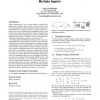Free Online Productivity Tools
i2Speak
i2Symbol
i2OCR
iTex2Img
iWeb2Print
iWeb2Shot
i2Type
iPdf2Split
iPdf2Merge
i2Bopomofo
i2Arabic
i2Style
i2Image
i2PDF
iLatex2Rtf
Sci2ools
128
click to vote
ATAL
2003
Springer
2003
Springer
Distributing the control of a temporal network among multiple agents
Agents collaborating on a set of tasks subject to temporal constraints must coordinate their activities to ensure that all of the temporal constraints are ultimately satisfied. Simple Temporal Networks (STNs) can be used to concisely represent temporal constraints; however, most algorithms for manipulating such networks presume that a single agent controls the network. Although recent research considers the controllability of networks in which Nature independently controls some temporal intervals, it nonetheless presumes that a single agent controls the rest of the network. This paper makes the following contributions. First, it argues for STNs augmented to accommodate the real-time execution of tasks. Although borrowing from existing approaches, it differs by sharply distinguishing between constraints in the network and the distribution of control over that network. Second, it introduces a more general conception of distributing control of a temporal network, one that is able to acc...
Related Content
| Added | 06 Jul 2010 |
| Updated | 06 Jul 2010 |
| Type | Conference |
| Year | 2003 |
| Where | ATAL |
| Authors | Luke Hunsberger |
Comments (0)

